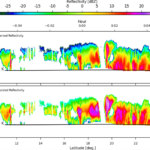The University of Maryland (UMD) will host the first ever Climate Action Forum on May 4th at its College Park campus.
The forum will precede the Climate Action 2016 Summit, to be held in Washington, D.C. on May 5th and 6th. Both the forum and the summit are designed to supplement the United Nations Climate Conference that took place in Paris last December.
Dr. Fernando Miralles-Wilhelm, Director of the University of Maryland’s Cooperative Institute for Climate and Satellites, is a co-organizer of the UMD-hosted event. He explained that the Paris agreements, which marked the 21st Conference of the Parties (COP21) of the United Nations, are primarily focused on the formulation of policies, but not on their implementation.
“Those meetings are particularly concentrated on trying to lay out road maps and policies and trying to get countries to agree to do things. But there’s really no follow up on what was agreed upon,” Miralles-Wilhelm said.
To keep the conversation going, a group of faculty and scientists at the University of Maryland, led by the Dean of Public Policy, Robert Orr, decided to bring world leaders together once again, this time in a different way.
According to Miralles-Wilhelm, Orr’s vision for a follow-on discussion would include science and technical experts, not just world leaders.
“He concocted this idea that it would be nice to have a mid-year summit that would be different,” explained Miralles-Wilhelm. “The audience would be slightly different; not just heads of state, but more of the doers. They would focus more on implementation of whatever was agreed on in the Paris meetings.”
While the larger two-day Climate Action Summit requires a formal invitation, the UMD-hosted Climate Action Forum is open to the public. Members of academia and leaders from the public and private sector were invited to submit detailed proposals, which will be discussed at the forum. So far, forum-organizers have received over sixty proposals, which they’ve pared-down to roughly twenty.
For scientists at UMD’s Earth System Science Interdisciplinary Center (ESSIC), the idea of reoccurring forums and workshops on climate change presents a unique opportunity for Center researchers to highlight their own efforts and expertise.
“Particularly [for] us here at ESSIC, we have a lot to contribute on the science side, so we’re very much looking forward to this happening more frequently,” said Miralles-Wilhelm.
As a first-time event, an overall consensus on how to best gauge success or a desired outcome is somewhat challenging. Organizers are optimistic however, that the UMD-hosted forum will help continue to bridge the gap between simply talking about climate change and actually doing something about it.
“There was a missing piece in the middle that connects the agreements and the policy-making, which is the theoretical and scientific backbone upon which you make decisions,” Miralles-Wilhelm noted. “What we expect this will do is create an academic backbone to the process.”





